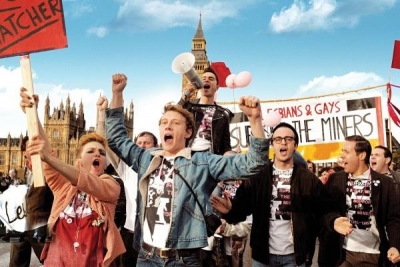I have just seen Pride, a film which chronicles the true story of how, in 1984, a London-based group of gay men and women decided to raise money to support the UK’s mining communities during the eponymous strikes. Not only is Pride an excellent film which recounts a lesser known history of that era, but it also shows just how far our nation has come with regard to LGBT rights in the intervening 30 years.
As a result of the relationships forged between the gay community and the miners in 1984, the Labour Party Conference in 1985 saw a resolution to support LGBT rights carried; the victory a direct result of block votes in support from the National Union of Mineworkers.
Since then, there has been steady, if not necessarily smooth, progress for Britain’s march toward equality for the LGBT community. Although full equality is yet to be achieved, significant gains have been made, such as introducing an equal age of consent, making discrimination in the workplace illegal, repealing the controversial ‘Section 28’, introducing civil partnerships and the legalisation of gay marriage.
In 1993, when President of the Southampton University Student Union, I had to take the really difficult decision of banning the armed forces from operating a stand at the careers fair due to their stance on gay people serving in the military. The justification from the Armed Forces at the time as to why homosexuals were banned from joining is truly shocking by today’s standards – a further example of the progress made in a short space of time.
Kevin Craig, President of the Southampton Students’ Union 1993, talks about banning the armed forces from operating a stand at the careers fair due to their stance on gay people serving in the military.
Can you believe that when I protested at the treatment of gay men and women – people who wanted to serve their country – by the Armed Forces I was told that “The Services are run on a system of discipline and this relies on complete trust and confidence between ranks”……..? Even harder to believe, Young Conservative students at the time tried to have me fired for taking this sort of stand. Things have changed greatly – for the better.
However, as is true with racism, sexism, and all other forms of discrimination, huge obstacles remain. One of the major issues lies in reforming social attitudes and prejudices, something that can involve a long and arduous process of education, protest and campaigning.
Yet, on a global scale, Britain is leading the way in many respects when it comes to promoting equality and enshrining those rights in law. Recent headline news of the arrest of Briton Ray Cole, who spent 20 days in prison after being detained whilst on holiday in Morocco for ‘gay acts’, highlight the appalling situation the LGBT community faces in countries across the globe. In countries such Morocco, Uganda, Sudan and Saudi Arabia, being gay can be a death sentence.
At the Labour Party Conference in September, Ed Miliband announced Lord Cashman’s appointment in the newly created role of Labour’s LGBT global rights envoy, created because LGBT rights “are going backwards” across the globe.
In his speech, Mr Miliband spoke out against what he sees as widespread and deeply disturbing human rights violations; “We’ve made such progress on equality. But we have to face the fact that internationally things, if anything, are going backwards.”
Former actor and co-founder of the charity Stonewall, Lord Cashman served as an MEP for 15 years before stepping down this year and taking his seat in the Lords. In this new role, he will champion the rights of LGBT communities abroad, speaking out against the human rights violations and appalling acts of discrimination that are experienced every day across the globe.
This political appointment is a further display of Britain’s commitment to promoting equality and tolerance. Much remains to be done, but we continue to move in the right direction.
One day I hope, what is happening across the world – today – will be looked at with the same incredulity that we feel when we see what was being said publicly in our own country only two short decades ago.





